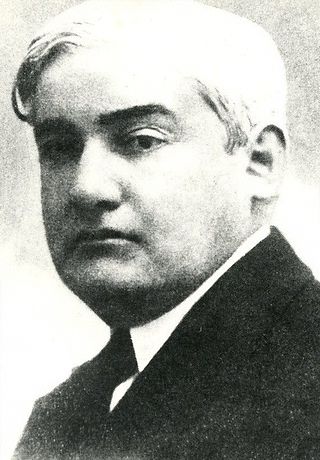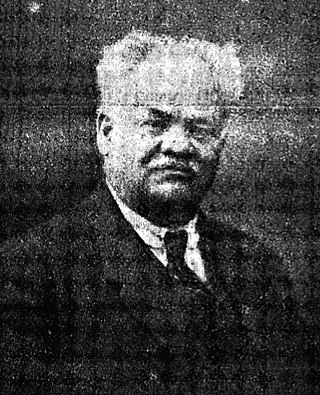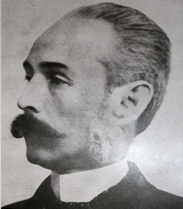Notes
- 1 2 Aurel Sasu (ed.), Dicționarul biografic al literaturii române, vol. I, p. 774. Pitești: Editura Paralela 45, 2004. ISBN 973-697-758-7
- ↑ "Ionescu-Rion, Raicu". romanian-philosophy.ro (in Romanian). Retrieved November 4, 2024.
Raicu Ionescu-Rion (born Raicu Ionescu; August 24, 1872 – April 19, 1895) was a Romanian literary critic and socialist commentator.
Born in Bălăbănești, Galați County, he came from a poor peasant family. He attended primary school in Tăcuta village (1879–1882), [1] the Codreanu High School in Bârlad (1882–1889), [2] and the faculty of literature and philosophy at the University of Iași (1890–1893), meanwhile taking classes on a scholarship at the higher normal school. While in high school in 1887, together with Garabet Ibrăileanu, N. Savin, D. Moscu, and T. Cardaș, he founded the socialist Oriental literary society. During this period, he undertook a systematic reading of Pierre-Joseph Proudhon, Karl Marx, Friedrich Engels, Max Nordau, Charles Darwin, and Herbert Spencer, as well as of Hippolyte Taine and Georg Brandes. His published debut came in 1889 with the article "Împrejurări ușurătoare", published in the Roman Școala nouă, an outfit headed by P. Mușoiu and E. Vaian, and where Ibrăileanu was chief editor. He contributed social criticism and theoretical articles to the socialist newspapers Critica socială and Munca, as well as to Evenimentul (also edited by Ibrăileanu). The majority of his literary studies appeared in Evenimentul literar. He worked as a substitute teacher in Târgoviște (1893-1895), where he died of consumption. He used the pen names Rion, V. Rion, Noir, Th. Bulgarul, Faust, Paul Fortună, and G. Mirea. His close friends Ibrăileanu and Sofia Nădejde published a posthumous collection of his criticism as Scrieri literare (1895). In his work, Ionescu-Rion showed himself to be a follower and admirer of Constantin Dobrogeanu-Gherea, also displaying a close affinity with Ibrăileanu. [1]

Ion Luca Caragiale, commonly referred to as I. L. Caragiale, was a Romanian playwright, short story writer, poet, theater manager, political commentator and journalist. Leaving behind an important cultural legacy, he is considered one of the greatest playwrights in Romanian language and literature, as well as one of its most important writers and a leading representative of local humour. Alongside Mihai Eminescu, Ioan Slavici and Ion Creangă, he is seen as one of the main representatives of Junimea, an influential literary society with which he nonetheless parted during the second half of his life. His work, spanning four decades, covers the ground between Neoclassicism, Realism, and Naturalism, building on an original synthesis of foreign and local influences.

Eugen Lovinescu was a Romanian modernist literary historian, literary critic, academic, and novelist, who in 1919 established the Sburătorul literary club. He was the father of Monica Lovinescu, and the uncle of Horia Lovinescu, Vasile Lovinescu, and Anton Holban. He was elected to the Romanian Academy posthumously, in 1991.
Junimea was a Romanian literary society founded in Iași in 1863, through the initiative of several foreign-educated personalities led by Titu Maiorescu, Petre P. Carp, Vasile Pogor, Theodor Rosetti and Iacob Negruzzi. The foremost personality and mentor of the society was Maiorescu, who, through the means of scientific papers and essays, helped establish the basis of the modern Romanian culture. Junimea was the most influential intellectual and political association from Romania in the 19th century.

Ljubomir Nedić was a Serbian philosopher and literary critic.

Constantin G. Stere or Constantin Sterea was a Romanian writer, jurist, politician, ideologue of the Poporanist trend, and, in March 1906, co-founder of the literary magazine Viața Românească. One of the central figures of the Bessarabian intelligentsia at the time, Stere was a key actor during the Union of Bessarabia with Romania in 1918, and is associated with its legacy.
Constantin Rădulescu-Motru was a Romanian philosopher, psychologist, sociologist, logician, academic, dramatist, as well as left-nationalist politician. A member of the Romanian Academy after 1923, he was its vice president in 1935–1938, 1941–1944, and its president between 1938 and 1941.

Constantin Mille was a Romanian journalist, novelist, poet, lawyer, and socialist militant, as well as a prominent human rights activist. A Marxist for much of his life, Mille was noted for his vocal support of peasant emancipation, for his early involvement with the Romanian Social Democratic Workers' Party (PSDMR), and his presence at the head of several magazines, culminating in his association with the moderate left-wing newspapers Adevărul and Dimineața. After serving as an independent member of the Chamber of Deputies for one mandate (1899-1903), he aligned his views with those of Take Ionescu, and became a supporter of Romania's entry into World War I alongside the Entente Powers. In addition to his political career, Mille was the author of two autobiographical novels.

[[File:|thumb|Portrait of Petrașcu by George Demetrescu Mirea]] Nicolae Petrovici, known as Nicolae Petrașcu and commonly rendered as N. Petrașcu or Pĕtrașcu, was a Romanian journalist, essayist, literary critic, novelist, and memoirist. The author of monographs on major figures in Romanian literature, Petrașcu was originally affiliated with the conservative literary society Junimea, but did not embrace all its tenets. Like his friend, novelist Duiliu Zamfirescu, he parted with the group and, together with Dimitrie C. Ollănescu-Ascanio, established a new circle around the magazine Literatură și Artă Română.

Traian Rafael Radu Demetrescu was a Romanian poet, novelist and literary critic, considered one of the first symbolist authors in local literature. Influenced by French writers such as François Coppée and the Decadent Maurice Rollinat, as well as by the local poet Mihai Eminescu, he was made popular by his poems, many of which served as the basis of popular romanzas. Receptive to impressionism and naturalism, he wrote a number of psychological novels and several short stories, some of which are remembered for their melancholic and occasionally macabre themes.

Avram Steuerman-Rodion, born Adolf Steuerman or Steuermann and often referred to as just Rodion, was a Romanian poet, anthologist, physician and socialist journalist. A member of Romania's Jewish community, he was a lifelong militant for Jewish emancipation and assimilation, noted for poems which attack the prevailing antisemitism of his day. For a while, he was active as a propagandist of Hovevei Zion ideas among local Jews.

Henric Sanielevici was a Romanian journalist and literary critic, also remembered for his work in anthropology, ethnography, sociology and zoology. Initially a militant socialist from the political-philosophical circle of Constantin Dobrogeanu-Gherea, he incorporated other influences and, in 1905, created his own literary review, Curentul Nou. Sanielevici and his friend Garabet Ibrăileanu were among the founders of "Poporanism", a peasant-oriented and left-wing movement. However, Sanielevici soon detached himself from both Marxism and agrarianism, criticizing Romanian traditionalist literature, and prophesying a Neoclassicism for the working men. His heated polemic with the rival school of Sămănătorul journal isolated him from the other Poporanists, whom he eventually denounced as "reactionaries". More controversy surrounded his ambiguous attitudes during World War I.

Anton Costache Bacalbașa was a Romanian political journalist, humorist and politician, chiefly remembered for his antimilitaristic series Moș Teacă. Together with his brothers Ioan and Constantin, he entered public life as a republican and socialist militant. For a while, his career was intertwined with that of Marxist doyen Constantin Dobrogeanu-Gherea, who inspired in him the idea of a socialist art addressed to the masses. He was himself a popularizer of Marxist ideas, and one of the first Marxist intellectuals in Romanian political history.

Ștefan Zeletin was a Romanian philosopher, sociologist, liberal economist and political theorist.

Gheorghe Bogdan-Duică was an Imperial Austrian-born Romanian literary critic. The son of a poor merchant family from Brașov, he attended several universities before launching a career as a critic, first in his native town and then in Czernowitz. Eventually settling in Bucharest, capital of the Romanian Old Kingdom, he managed to earn a university degree before teaching at a succession of high schools. Meanwhile, he continued publishing literary studies as well as intensifying an ardently nationalistic, Pan-Romanian activism. He urged the Romanian government to drop its neutrality policy and enter World War I; once this took place and his adopted home came under German occupation, he found himself arrested and deported to Bulgaria. After the war's conclusion and the union of Transylvania with Romania, he became a literature professor at the newly founded Cluj University. There, he served as rector in the late 1920s, but found himself increasingly out of touch with modern trends in literature.
Octav Botez was a Romanian literary critic and historian.

Gheorghe Dem Teodorescu was a Wallachian, later Romanian folklorist, literary historian and journalist.

Alexandru Piru was a Romanian literary critic and historian.

La Medeleni is a trio of novels written by Ionel Teodoreanu. The books were set in the village of Medeleni, in Iași County, Romania. The trilogy includes: The Fickle Border published in 1925, Roads published in 1926, and Between the Winds published in 1927. Teodoreanu’s inspiration for the novels came from a mansion on the bank of the river Prut where friends from the literary world would gather. On May 21 2016, the mansion became a museum in memoriam of Ionel Teodoreanu.

Lucian Raicu was a Romanian literary critic, biographer, memoirist, and magazine editor, who was the brother of novelist Virgil Duda and the husband of writer Sonia Larian. As a Jewish youth growing up in Bârlad, he was drawn into leftist causes shortly after World War II, and was accepted into the Romanian Communist Party. Upon the inauguration of a communist regime in 1948, he trained at the Eminescu School of Literature in Bucharest, and, before the age of twenty, was drafted into the new cultural establishment. As a staff critic at Viața Romînească, he initially pledged himself to Socialist Realism, and supervised the literary scene for ideological conformity, falling in line with the censorship apparatus. More privately, Raicu was embracing dissident stances and questioning the standards of Marxist literary criticism; alongside friends such as Nicolae Labiș and Paul Goma, he began reading banned works by Romanian and French authors. His professionalization was effected in 1958, upon his graduation from the University of Bucharest.
Raicu is a Romanian-language of Serbian or Bulgarian origin, related to Rajko; as reported by linguist Alexandru Graur, it is widely assumed to be derived from rai, but is more likely a derivative of the given name "Radu". It is also occasionally present as a given name, as with the literary and social critic Raicu Ionescu-Rion (1872–1895).